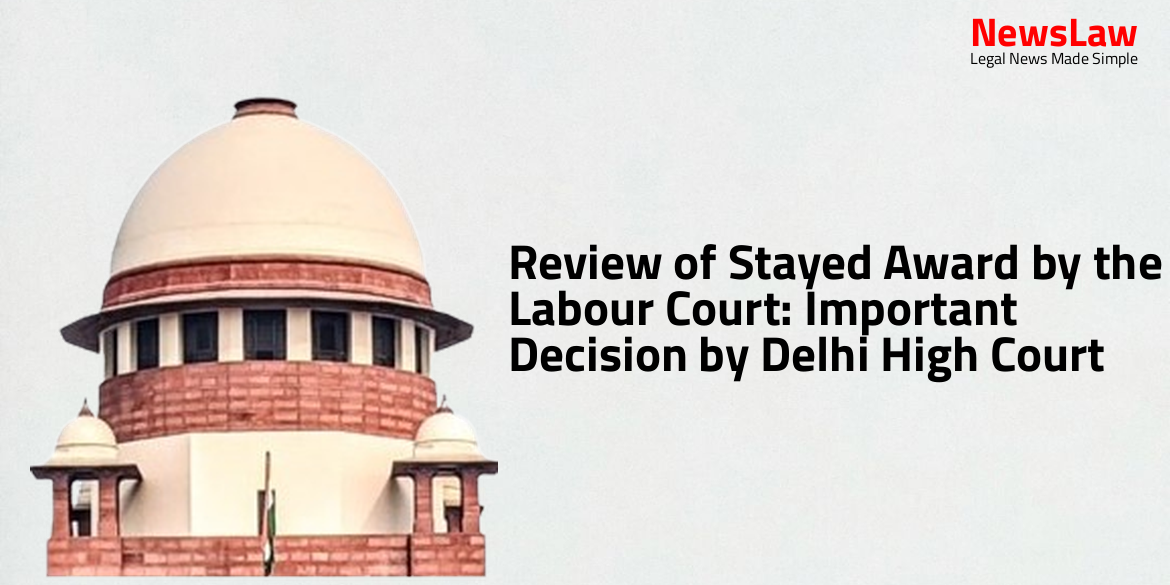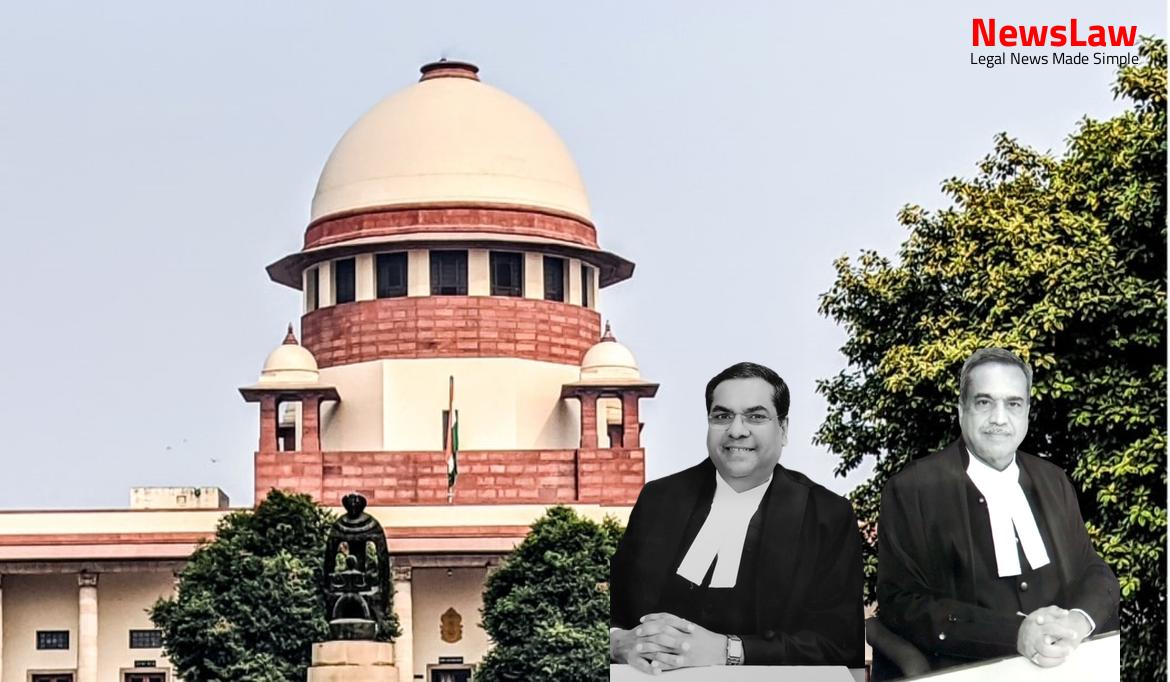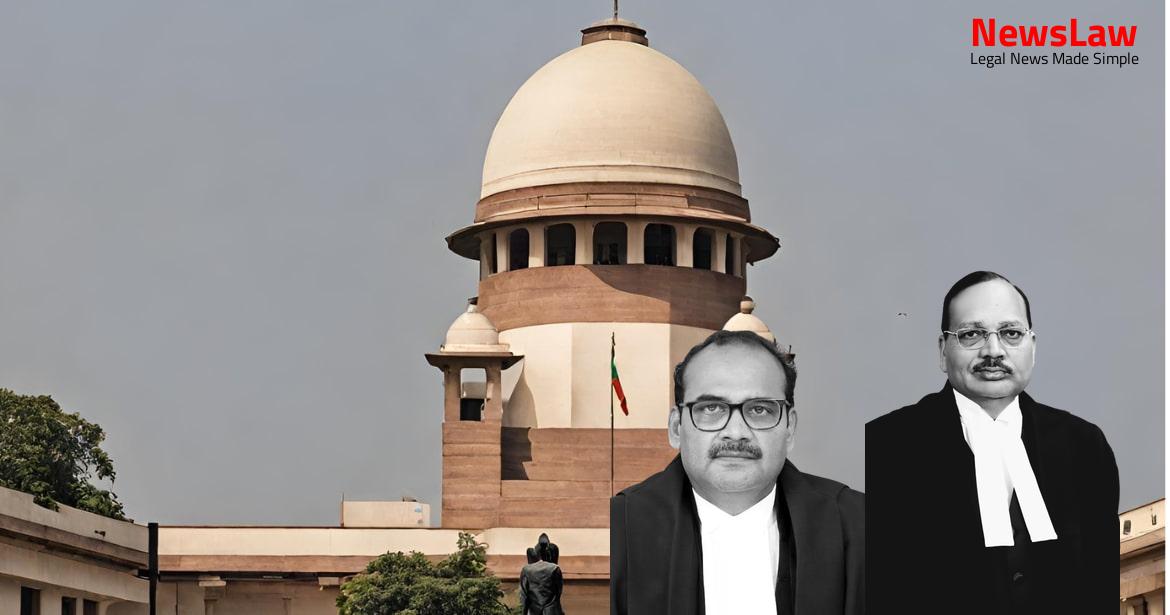In a recent legal case before the Delhi High Court, a significant decision was made regarding the review of a stayed award by the Labour Court. The case involved a dispute between the management and a workman over retrenchment compensation and designation issues. The court’s ruling sheds light on the intricacies of labor law and the interpretation of previous judgments. Stay tuned to learn more about this compelling legal battle and its implications on workplace rights and compensations.
Facts
- The workman failed to acknowledge his designation as an unskilled laborer, as per the minimum rates of wages notified.
- The workman had consistently received the salary prescribed for an unskilled nature of work without objection.
- The stay application in the designation matter was not pursued urgently by either party, indicating lack of urgency.
- The judgments cited by the Labor Court were not directly applicable to the current case.
- The workman never challenged the Industrial Tribunal’s designation of him as an ‘unskilled’ worker.
- The outcome of the pending Writ Petition No. 3014/10 could potentially nullify the impugned award based on similar grounds.
- The workman’s designation as a ‘packer’ falls under the category of ‘unskilled’ workers in the specified employment schedules.
- The facts and circumstances of the present case differ significantly from previous judgments cited by the Labor Court.
- The Labour Court found that Sections 9A and 25-N of the Act did not apply in this case.
- The claimant had not worked with management from the date of transfer till the date of rejoining.
- Management is required to give retrenchment compensation based on the period for which the workman had actually worked as per Section 25-F.
- The High Court stayed the order declaring the transfer of workers illegal in 2006.
- The service of the claimant was retrenched after several years of the order being stayed.
- The Labour Court awarded the workman a compensation of Rs.200,000 plus interest for the period specified.
- The Labour Court ruled in favor of the respondent workman and directed the management to pay the compensation within one month.
- Reinstatement was not an option due to the company’s imminent closure, thus wages of the skilled/semi-skilled category were to be paid.
- The compensation calculation by the management did not consider the wages of skilled and semi-skilled workers as ordered by POIT.
- The designation case for all 22 workers was decided by POIT on 29.09.2009, granting them skilled and semi-skilled worker designations.
Issue
- Issue 2 in the case pertains to the reliance of the stayed award of the Industrial Tribunal by the learned Labour Court.
- The Workman in question had been receiving the salary of an “unskilled” laborer from the time of appointment till the point of retrenchment.
- The crucial query is whether the Industrial Tribunal’s stayed award can be used by the Labour Court to determine the entitlement of the Workman to compensation.
- The Court needs to decide if the impugned award of the Labour Court is subject to review under Article 226 of the Constitution of India.
Arguments
- The petitioner argues that the impugned award was passed without considering all facts and circumstances of the matter.
- Despite the Industrial Tribunal declaring transfer orders as illegal, the petitioner took the matter to the Court to avoid liability under section 17B of the Act.
- The petitioner alleges that the workman is being penalized for forming a union to address grievances before labor authorities.
- The petitioner contends that the retrenchment compensation issue is not straightforward and does not indicate any malicious intent.
- The petitioner asserts that the writ jurisdiction of the Court cannot re-evaluate evidence to overturn the award unless illegality or perversity is demonstrated.
- The petitioner maintains that the impugned award was rightfully passed by the Labour Court.
- The petitioner argues that if the designation matter award dated 29 September, 2009 is set aside, the current award would become void.
- The petitioner highlights that the workman never objected to receiving wages for unskilled labor, suggesting he never disputed his job status.
- The petitioner emphasizes that the workman’s salary was always consistent with unskilled labor rates and no objections were raised during employment.
- The petitioner points out that the High Court itself acknowledged in Writ Petition No 3014/2010 that the Industrial Tribunal’s conclusion without documents was not legally sustainable.
- Arguments presented by Ld. ARM regarding the calculation of retrenchment compensation and notice pay as per the claimant’s last drawn wages.
- Reference to the case filed by the claimant against his transfer, where it was determined that he was performing an unskilled job.
- Assertion that the said award from the transfer case was not challenged by the claimant before any forum, making it final and operating as res-judicata.
Analysis
- The Labour Court found that the management erred in not calculating notice pay and compensation as per the 2009 award, violating section 25-F of the Act.
- The management failed to provide evidence contrary to the seniority list prepared by the claimant, which was on record.
- The court held that the retrenchment compensation should have been calculated based on the claimant’s skilled/semi-skilled worker designation, not as an unskilled laborer.
- The court rejected the argument that reliance on the 2009 award was misplaced due to a subsequent stay, as the compensation was warranted before the stay was imposed.
- In light of various evidence and findings, the court ruled in favor of the claimant and against the management on the issues of retrenchment and compensation.
- Section 144 CPC provides for the variation, reversal, setting aside, or modification of a decree.
- The successful party at the final decision stage is entitled to demand restitution to be placed in the position they would have been if the earlier decision had not been passed.
- Restitution is an obligation of the court to restore parties to their original position after an interim decision is reversed.
- Judicial precedents, such as Nava Bharat Ferro Alloys Ltd v. Transmission Corporation of Andhra Pradesh Ltd., State of Rajasthan v. J.K. Synthetics Ltd., and South Eastern Coalfields Ltd. v. State of M.P., emphasize the importance of restitution in legal matters.
- The distinction between repeal and suspension of a law is crucial, with repeal abolishing the law entirely while suspension retains the law with limited operation.
- Quashing an order that had been stayed does not revive the order, as reinstatement requires the final disposal of the case.
- The court is duty-bound to restore parties to their original position after the dismissal of a substantive proceeding that had been stayed.
- Section 25-F of the Act sets conditions for the retrenchment of a workman.
- Employer must provide one month’s notice or pay wages in lieu of notice for retrenchment.
- Employer must pay compensation equivalent to fifteen days average pay for every completed year of service.
- Continuous service for at least one year with the employer is necessary for a valid claim for compensation.
- Continuous service requirement reiterated by the Hon‟ble Supreme Court in L. Robert D’Souza v. Executive Engineer, S. Rly.
- The Court finds no merit in the petitions and upholds the findings of the Labour Court.
- The petitioner management failed to present any strong arguments in their favor.
- The Labour Court’s findings in all connected matters were similar, highlighting illegal retrenchment of workers without proper compensation.
Decision
- Management directed to pay Rs.2,00,000 to the workman within one month from the date of publication of the award
- If payment is delayed, management liable to pay interest at 9% per annum until realization
- Parties to bear their own costs
- Award passed accordingly
- Copies of the award to be sent to the Govt. of NCT of Delhi for publication
- File to be consigned to record room
Case Title: SAWHNEY RUBBER INDUSTRIES Vs. SH. PRAMOD KUMAR (2024:DHC:4569)
Case Number: W.P.(C)-6071/2020



